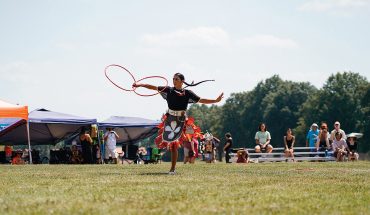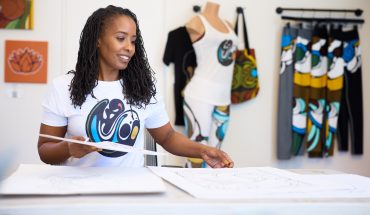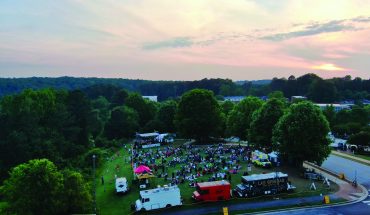
Reagan Weaver, Rotary Club president; Wilson Hayman, co-chair, 100th Anniversary Gala Committee; Ian Finley, playwright, Burning Coal Theater; Sam Stone, historian; Mary Moss, chair, 100th Anniversary Steering Committee. Photograph by Jason Dail
by Todd Cohen
The Rotary Club of Raleigh has long brought together people of diverse perspectives for the purpose of doing good. The nonpartisan club, which celebrates its 100th anniversary this year, has attracted civic, business and government leaders of all political stripes. Conservative Jesse Helms served as president one year. This year, the organization is led by Reagan Weaver, a lawyer and unabashed liberal.
“Rotarians tend to be leaders in the community,” Weaver says. “Rotary provides them a vehicle to associate with each other and through that fellowship to try to meet unmet needs in the community and in the world at large.”
Raleigh’s Rotary believes it is the oldest civic group in North Carolina. In 1927, the Club paid $3,500 to buy the land for what became the Boy Scouts’ Camp Durant. Every year since 1979, in addition to funds it raises and gives to causes, the Club has raised thousands of additional dollars for the Salvation Army of Wake County. About 25 years ago, it raised $115,000 as part of Rotary International’s End Polio Now campaign, an effort that helped reduce the number of cases of polio throughout the world to 223 in 2012 from more than 350,000 in 1988. And its members have volunteered countless hours for local and international causes. To celebrate its centenary, Rotary has commissioned a play that Burning Coal Theater Company will stage in November. It has also created a written history and is the focus of an exhibit at the City of Raleigh Museum that ends this month.
“The point of Rotary is doing good in the world, both in our communities locally and internationally,” Weaver says. A Greensboro native, Weaver, 63, has spent most of his legal career in sole practice at Capital District Law Offices, serving as a dispute resolution advocate. Weaver is married to Ardath Goldstein Weaver, research director for the North Carolina Arts Council. They have two grown children.
How does Rotary bridge differences that otherwise often divide people?
It has as one of its goals peace and conflict prevention and resolution. Rotary has sponsored ambassadors for many years where nonmembers, often young people, can receive scholarships to study abroad for a year. That makes a great statement that the only way you can really understand a different people or culture is by living with them. To help celebrate its 100th birthday, the Rotary Club of Raleigh has raised nearly $200,000 for the dental clinic at Wake Smiles.
What is Wake Smiles?
They are providing dental care to low-income, uninsured adults. The Salvation Army provides rent-free facilities for the Rotary Club of Raleigh Dental Clinic, operated by Wake Smiles. This is very much a partnership between the Wake County Dental Society and the Salvation Army and Rotary Club of Raleigh. There was also a very important initial grant of $350,000 by Blue Cross Blue Shield. The clinic opened in March 2014 at the Salvation Army Center of Hope.
How did the Raleigh Club get started?
Manly Tyree was a photographer in 1914. He was friends with a photographer in a Washington, D.C., Rotary club that had been formed two years earlier. He decided to call a group of businessmen together to form the Rotary Club of Raleigh.
What is your earliest memory of philanthropy?
Through our church. I was raised a pretty strong member of the Episcopal church in Greensboro – first St. Andrews, and my parents helped start St. Barnabus, a mission church. I was an acolyte in elementary school and through high school, volunteering for whatever projects the church would have been involved in.
Why did you become a lawyer?
I attended a conference that was offered by the North Carolina Human Relations Council on the “role of the white churchman in the black community.” It really caused me to become very interested in fighting racism and sexism… I wanted to be able to effect more significant change. I felt I could do that best by going back to school and becoming a lawyer.
Who are your heroes?
Martin Luther King. Abraham Lincoln.
Why?
Courage, especially in facing unpopular issues and effectively handling them.
What motivates you each day to do something to give back?
My sense of responsibility.
What do you like about Raleigh?
I love the opportunities that Raleigh offers. It’s a cosmopolitan community without having the huge size of New York City or San Francisco. The only thing I don’t like about Raleigh is its climate during July and August.
If you could fix a social problem, what would it be?
I would focus on the needs of children as the next generation, and whatever we can do to provide better health and better education.
What inspires you?
The opportunity to serve. I want make a difference.
What is your philosophy of life?
When I was director of the Human Relations Commission in High Point, a guy on my board named Harvey Tillis would repeat that the only thing that was important in this world was the golden rule. I found that insufficient for my goal of fighting racism and sexism. But the chickens have come home to roost. I now agree completely with him.



